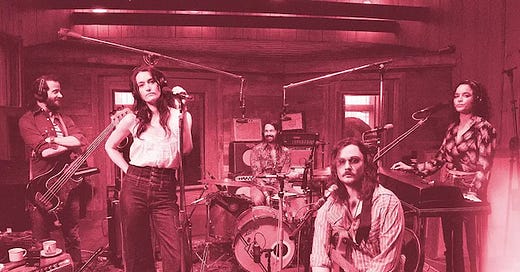'Stereophonic' Delivers Second-Hand Blues
The hit play-with-music is up for a record thirteen Tony Awards. Maybe it just went over my head.
(HUDSON, N.Y., Friday, June 14, 2024) -- The Tony Awards take place this Sunday night (June 16, 2024), and while I typically put absolutely no stock in award shows and try my best to ignore them, it does give me a good excuse to talk a bit about Stereophonic, going into Sunday night’s ceremony with the most nominations ever (13) for a play. Not that I need such an excuse to explore my reactions to the play, which I saw last weekend at the Golden Theatre in Manhattan, but it does add an element of timeliness to my review, for whatever that is worth.
Much has been written about Stereophonic, and reviews have been overwhelmingly positive. The play – written by David Adjmi with original songs by Will Butler, formerly of indie-rock group Arcade Fire – is a hybrid, one part soap opera and another part like an episode of VH1’s Behind the Music. Given that basic setup, the show is entertaining – apparently very entertaining to many or most who see it. The acting is good – especially given what the actors are given to work with, including plenty of leaden or hackneyed dialogue lacking real wit or humanity -- and the actors’ performances as singers and musicians are even better.
Going into the show, I had high expectations for the original songs, given Butler’s longstanding association with Arcade Fire, one of the most creative, exciting, and intelligent rock groups of the last two decades. And while the music was played perfectly by the cast, it was not particularly compelling. Nothing jumped out as a potential hit single (which the play wants you to believe you are hearing), and it’s not likely many audience members leave the theater humming the melodies. (To be fair, this is a play that happens to have some songs in it, not a musical with fully fleshed-out show tunes.)
ONE CANNOT WATCH Stereophonic, which takes place entirely within the confines of a brilliantly designed recording studio, and not think of the 1970s British-American supergroup Fleetwood Mac. The basic premise is that after one hit album the group is struggling to complete a masterpiece (think Fleetwood Mac’s Rumours), bogged down by personal problems and creative differences. Like Fleetwood Mac, the fictional group (we’re never given their name) is a quintet, a hybrid in which a Southern California male-female duo (think Stevie Nicks and Lindsey Buckingham) are grafted onto a British blues-rock trio (think the original version of post-Peter Green Fleetwood Mac). The Buckingham-like character has emerged as something of a control freak, both in his overall relationship to the album and the band (at one point he calls it “my group”) and in his personal relationship with the Stevie Nicks-like character. The male bassist and female singer-keyboardist are having marital problems of their own, and the drummer pines for his wife and family back home (these three characters, like Christine and John McVie and Mick Fleetwood, are all given English accents, furthering the identification with Fleetwood Mac).
Credit Adjmi with not feeling bound by every nuance of the Fleetwood Mac story. Surprisingly, he steers away from the intra-group sexual dalliances and betrayals that fueled the songs on Rumours and that Fleetwood Mac played up in subsequent press and publicity for the album; those may have made the soap-opera aspect of the story more compelling. And while sparkling dialogue is clearly not his strong suit, Adjmi occasionally comes up with a zinger; there is a subtle but pointed Daryl Hall joke embedded into the text that earned a few hearty snickers amongst those audience members in the know about Hall’s reputation in the music industry.
The play is weakened, however, by having it open in medias res, with the band members already at each other’s throats. By giving us almost no indication of what made the five musicians click in the first place, what made them want to collaborate and join forces as a group, there is less at stake. To quote Bob Dylan, “When you’ve got nothing, you’ve got nothing to lose.” Playgoers are left having to fill in the backstory that would have made us care a lot more about the characters and their downfall. Because in the end this is not the Fleetwood Mac story, we need something else to hold onto, something we are never given.
MINE IS OBVIOUSLY A MINORITY OPINION, which is typically my default position. (Why else be a critic?) Back in 1977, I was pretty much alone among my high-school classmates in not being head-over-heels crazy about Rumours nor Fleetwood Mac. I think I even gave the album a bad review in my music column in the high school newspaper. (I was more excited by the likes of Patti Smith, Bruce Springsteen, and David Bowie back then.) And I am not saying that Stereophonic is without any redeeming qualities or virtues. I just think that given the amount of talent that went into the making of the show, both off and on stage, it could have been so much better. Still, as much as I give a hoot (almost not at all), I suppose I will be quietly, subconsciously rooting for Stereophonic on Sunday night.
Hey, did you like this edition of Everything Is Broken? If so, please consider clicking on the “LIKE” button at the very end of this message. It matters to the gods of Substack.
Roll Call: Founding Members
Anne Fredericks
Anonymous (7)
Erik Bruun
Nadine Habousha Cohen
Fred Collins
Fluffforager
Benno Friedman
Amy and Howard Friedner
Jackie and Larry Horn
Richard Koplin
Paul Paradiso
Steve and Helice Picheny
David Rubman
Spencertown Academy Arts Center
Elisa Spungen and Rob Bildner/Berkshires Farm Table Cookbook
Julie Abraham Stone
Mary Herr Tally




